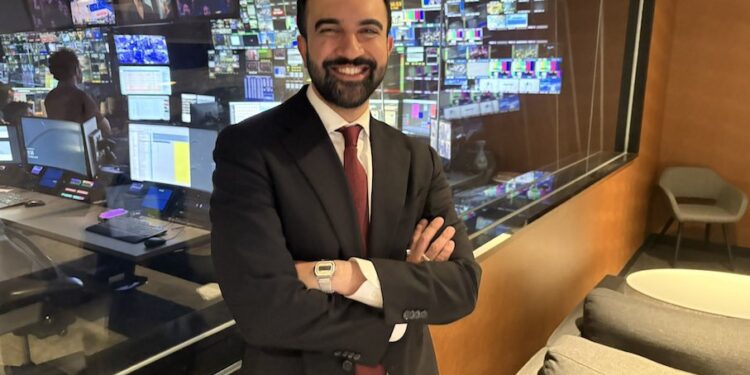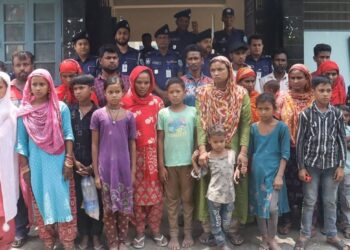As New York City mayoral candidate Zohran Mamdani faces a wave of criticism from some Hindu and Indo-American leaders over his outspoken stance on Indian Prime Minister Narendra Modi and Hindu nationalism, a growing chorus of Indian Americans are publicly throwing their support behind him — highlighting a deepening generational and ideological divide within the community.
Sunita Viswanath, co-founder of the advocacy group Hindus for Human Rights (HfHR), condemned the backlash against Mamdani, calling for a rejection of hate-driven politics. “As a Hindu, I am deeply chagrined at the attacks on @ZohranKMamdani from some Hindus. We are better than this. #NoToHate,” Viswanath wrote in a post on X earlier this month.
Mamdani, the son of acclaimed filmmaker Mira Nair, has built his campaign on bold progressive policies — with affordability, immigrant rights, and economic justice at the forefront. His platform has particularly struck a chord with younger, working-class, and progressive South Asians across the city.
That support was cemented on June 11 when the influential Indian American Impact Fund, a political action committee dedicated to building South Asian political power, endorsed Mamdani. “We’re thrilled to endorse Zohran Mamdani for mayor because he offers a clear vision to address the urgent economic challenges facing New Yorkers today,” said the Fund’s executive director, Chintan Patel. “His focus on affordability and economic justice resonates deeply across South Asian communities and beyond.”
Patel also underscored the historic nature of Mamdani’s candidacy. “This campaign is about changing who gets seen, heard, and prioritised in City Hall,” he said, with Mamdani adding that he was “honoured” to have the group’s backing.
The candidate’s Bollywood-inspired campaign ad — believed to be crafted with the creative influence of his mother — has further cemented his popularity in desi circles. Delivered almost entirely in Hindi and Urdu and packed with vintage Bollywood references, the ad became a viral sensation among South Asian New Yorkers, lighting up family WhatsApp groups and making headlines as far away as India.
Swati Khurana, a South Asian American writer based in Harlem, called the ad “an immediate hit,” saying it spoke directly to the diaspora experience. Versha Sharma, editor-in-chief of Teen Vogue, observed that Mamdani’s campaign has captured the imagination of younger Indian Americans. “I feel like every young South Asian that I know who’s registered in New York knows who he is, is talking about him, is sharing messaging of his policies and his platform with others as well,” Sharma said.
Indian American political strategist Amit Singh Bagga credited Mamdani with “completely shifting the political paradigm for South Asians in the United States,” citing his ability to engage working-class immigrant communities often overlooked in mainstream campaigns.
Indeed, Mamdani’s campaign has invested heavily in outreach to South Asian neighbourhoods such as Jackson Heights, Kensington, Ozone Park, and Midwood — home to large populations of Indian, Pakistani, Bangladeshi, and Nepali immigrants. With backing from grassroots groups like DRUM Beats, his team has focused on building relationships in these communities through language, culture, and shared policy concerns.
Yet, the surge in Indian American support for Mamdani has not gone unchallenged. His critics, particularly from right-leaning Hindu organisations, have seized on past comments — including his 2020 protest against the Ram Temple and his recent remark labelling Modi a “war criminal” — to accuse him of harbouring anti-Hindu sentiments. Among them are Assemblywoman Jenifer Rajkumar and Jaspreet Singh, who have amplified the backlash in conservative circles.
While those critiques reflect the influence of Hindu nationalist politics in parts of the diaspora, they also underscore the divisions within the Indian American community. Analysts note that Mamdani’s strongest support comes from progressive, younger, and working-class voters, while some wealthier or more conservative South Asians remain sceptical, prioritising issues like crime and business regulation over his progressive platform.
Still, with endorsements from key Indian American groups, viral cultural outreach, and growing grassroots momentum, Mamdani’s campaign appears to have tapped into a desire for change among a significant segment of New York’s South Asian electorate.
As Khurana put it, “It’s not just about identity — it’s about someone who understands our stories, speaks our language, and is fighting for all New Yorkers, especially those too often ignored.”











